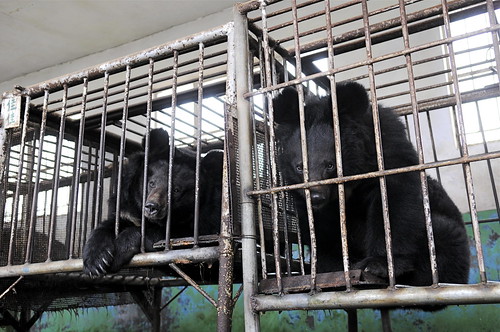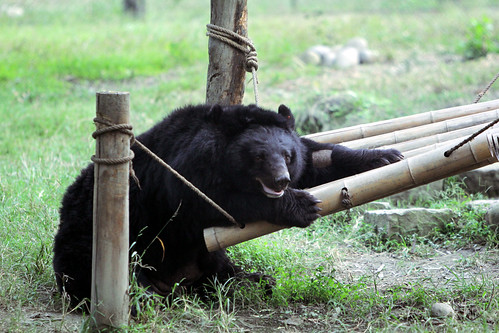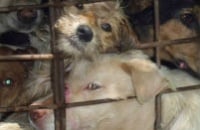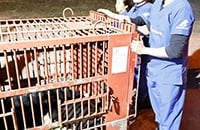The 10 steps required to rescue thousands of caged bears and end bile farming in China
05 April 2016
Animals Asia founder Jill Robinson outlines the 10 steps required to humanely end bear bile farming in China.
As the only NGO in China rescuing bears, Animals Asia’s space and resources are finite. Clearly while we can make a world of difference to a small number of bears - we cannot end bear bile farming on our own.
Our sanctuary is a vital example of what can be achieved. Just as the bears we rescue help promote the campaign to end bear bile farming, they also show the damage being done by the industry.
The danger is that bear bile farming is allowed to grow, unchecked and unregulated to a point whereby the logistics of ending it become too huge to contemplate. We talk of industries becoming too big to fail, bear bile farming must not become too big to close. Each passing year only makes the situation more difficult.
For this plan to be workable it must be acceptable to all groups - from animal lovers to bear farmers. For over two decades Animals Asia staff have worked within China, gaining valuable insight into the industry and understanding how it works. Every bear rescue undertaken has been a learning curve. The bureaucracy, the negotiations, the transport logistics, the emergency vet help required for rescued bears and, of course, their ongoing rehabilitation and care.
This is knowledge we want to share. We want to use to end this cruelty.
Animals Asia’s 10 steps to ending bear bile farming:
1. Establish a committee to oversee the whole process. Ensure all groups are represented. Mutually agree a timeframe - most likely between five and ten years.
2. Make the relocation of the bears central from the outset. It’s unlikely that there will be one answer to this question. Potential placements includes - new sanctuaries, converted bile farms, approved zoos and animal parks. Ensure the needs of the bears themselves are met by their new carers including rehabilitation and an ongoing high level of welfare.
3. Upgrade Asiatic black bears from Category II to Category I within China’s wildlife laws. This would essentially mean the industry would no longer be allowed to operate.
4. Stop all breeding on bear bile farms and bear trading between bile farms. Prepare bear bile inventories across the country and list all bears ahead of a wider investigation.
5. Cease registration and sale of bear bile medicines while promoting bear bile substitutes.
6. Investigate bear farms across the country to:
- Assess the welfare of bears and establish a criteria for those bears needing veterinary care. Then prioritise the order in which farms should be closed and bears relocated.
- Assess infrastructure in order to make recommendations. This includes bear numbers, staff, financial resources, food supply, water, electricity and integrity of buildings. Is there potential for conversion to sanctuary?
- Assess any bear records already on file that will help in identifying and assisting individual bears.
7. Tighten customs controls and stop the illegal export and import of bear bile products
8. Research and publicise surveys of the wild black bear population while ensuring laws prohibiting hunting of bears, and anti-poaching measures and operations, are enforced. These are vital to ensure no wild caught bears are added to farms.
9. Make bear bile extraction a criminal act with severe penalties to prevent farmers from continuing.
10. Encourage bear farmers to exit the bear farming industry, and provide appropriate advice, training and assistance to bear farmers and members of the industry towards re-employment.
Jill Robinson has been campaigning to end bear bile farming for 23 years and is widely credited as being responsible for alerting the West to the cruelty. She founded Animals Asia in 1998. Since then Animals Asia has rescued almost 600 bears from bile farms in China and Vietnam. The foundation continues to care for almost 400 bears and enjoys overwhelming local and international support in this work.
FURTHER READING:
Chapter 1 – the one where Jill started it all
Chapter 2 - the one where Jill convinced Chinese authorities to set up a sanctuary
Chapter 3 - the one where a new Vietnam sanctuary is opened
Chapter 4 – the one where the first bear arrived
20 years and 400 bears – how change was made
BACK









 5 reasons the dog meat trade must end
5 reasons the dog meat trade must end
 New year, new home for Christmas the Bear!
New year, new home for Christmas the Bear!
 Veterinary welfare training – pain management
Veterinary welfare training – pain management